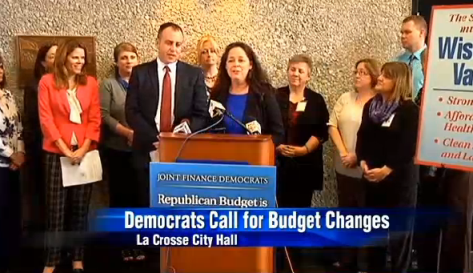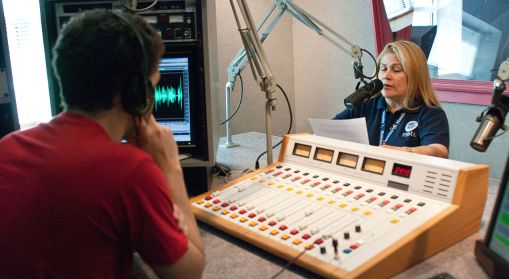Images not loading? View this e-mail in your web browser.

(608)266-5780 | State Capitol, Room 307 West, P.O. Box 8953, Madison, WI 53708 | rep.billings@legis.wi.gov
COMMUNITY
EVENTS:
UW-L SOTA Project Funway Fashion Show
Myrick Park Center Open House & All City Sign-Up.
La Crosse Area Autism Event
CONTACT ME:
State Capitol
Room 307 West
P.O. Box 8953
Madison, WI 53708
Phone:
(608) 266-5780
Toll Free:
(888) 534-0095
rep.billings@legis.wi.gov
Friends and Neighbors,

For the past few weeks, legislators have been traveling across the state to get Wisconsinites' input on the budget. With busy public hearing weeks winding down, we in Madison are now getting ready to debate the many controversial budget proposals.
Since the budget was introduced in February, I've heard from a number of
my constituents, concerned about specific proposals. I think it is
vitally important that all Wisconsinites voice their opinions on this
budget, but that they also be mindful of one fact: the budget proposal
is not the budget.
From here, the budget will be debated by the Joint Finance Committee.
After Joint Finance has debated and altered the budget, it will then
head to the Assembly and Senate, and finally to the Governor for
signature. I am hopeful that, based on the public's reaction, our
legislators will carefully consider and amend this budget.
Best Wishes,

Jill Billings
State Representative
95th Assembly District



JOINT FINANCE DEMOCRATS HOLD STATEWIDE MEDIA EVENTS

This week, Democratic members of the Joint Finance Committee toured the state to discuss Walker's budget. During the press conferences, members spoke on budget provisions that were overwhelmingly opposed during public hearings. Cuts to SeniorCare and the proposed changes to the Department of Health Service's long-term care system, including FamilyCare, IRIS, and Aging and Disability Resource Centers (ADRC), faced harsh opposition by the public and families served by these programs.
I spoke at the media event in La Crosse on Wednesday to highlight the most divisive issues in our community. I want to offer my thanks to the hundreds of people who came to our local listening session and shared their opinions on the governor's budget. Through public listening sessions and conversations with my constituents, I've found that members of our community are most concerned about cuts to health care programs and public education -- K-12 and University System. Each of these areas of cuts will have direct and tangible impacts on their families.
Wisconsin legislators, like me, must listen to their constituency and work to remove these harmful, unnecessary proposals from our biennial budget.
CONSERVATION CONGRESS HOLDS ANNUAL PUBLIC HEARING
This Monday, April 13, the Conservation Congress is scheduled to hold a public hearing in La Crosse County. I will be attending this year's meeting, as I always find it to be a great night to hear from people in our area on views ranging from hunting to the protection of natural resources.
The protection of our state is of vital importance to the people in La
Crosse County. This year, the Governor's proposed budget cuts to
important environmental programs pose significant issues for Wisconsin's
natural resource preservation. Here are a few of the cuts and changes
that could impact our state's environment:
Stewardship Cuts
One of Gov. Walker's more harmful environmental proposals involves
freezing the Knowles-Nelson Stewardship Fund. The Knowles-Nelson
Stewardship Fund, set up in 1989, is used to preserve valuable natural
areas and wildlife habitat, protect water quality and fisheries, and
expand opportunities for outdoor recreation. Each year, investments from
the Stewardship program provide jobs across the state, along with
billions in revenue. In La Crosse alone, groups like the Mississippi
Valley Conservancy regularly rely on Stewardship funds to protect public
lands.
If passed, Gov. Walker's proposal would effectively end the Stewardship
Program by establishing a moratorium on Stewardship land purchases until
the level of debt services is reduced to $1 per $8 of total costs for
land purchases.
Kickapoo Valley and Other Environmental Concerns
The Kickapoo Valley and its residents have been through quite their fair
share of history with government intervention. Many residents were
displaced by the 1962 Flood Control Act, which authorized the La Farge
Lake Project and ended prematurely in 1975, leaving an unfinished dam
across the valley. But more recently, the Ho-Chunk Nation has reclaimed
the land and the Kickapoo Reserve Management Board has worked ardently
to maintain a strong citizen voice in discussions regarding the Kickapoo
Valley.
As part of the his biennial budget proposal, Gov. Walker has planned to
turn control of the Kickapoo Valley over to the Department of Natural
Resources. Unfortunately, Governor Walker does not recognize the board's
viability or the improvements the Kickapoo Valley has enjoyed under the
management board's control. Governor Walker has undermined the
residents, primary benefactors and stakeholders of the Kickapoo Valley.
This proposal is made even more harmful by the further plans to cut the
DNR's science staff, largely responsible for ensuring clean air, water,
and land across the state.
This is one of a number of unnecessary and harmful alterations to
Wisconsin land management in Governor Walker's budget. Other budget
items of concern are:
- end citizen oversight through the natural resources board
- eliminates 18 science services positions for the DNR
- increases fees for using state parks, trails, and lands
- cuts important recycling programs
- cuts funding to the Complete Streets and Transportation
Alternatives Program
SIGN THE BUDGET PETITION!
Over the past couple of months, I have received numerous contacts from my constituents about Gov. Walker's budget. This budget impacts every family, worker and citizen of Wisconsin in different ways. Each person I've talked to from La Crosse has told a different story of how these budget cuts will impact them.
With that in mind, the Wisconsin Assembly Democrats launched the "SAY NO
to the Walker Budget" petition. Through this online petition, you can
register your opposition to the whole or individual parts of the budget,
and you can tell your legislators why you are opposed to this budget.

.jpg)